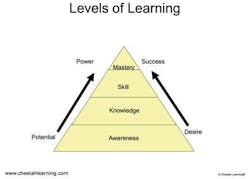A wonderful thing about humanity: most people love to learn. Think about how much fun it is when you have a question and you are able to succeed in finding the answer, through your own efforts researching online or in a library. You are intrinsically motivated to learn and feel good about having success with your own investigative efforts. This, at its very fundamental level, is considered learning.
Satisfying an emerging curiosity on a topic by researching an initial question is the first level of learning: awareness. But to truly achieve Mastery (the highest level of learning) on any topic, you have to move through four levels of learning: Awareness, Knowledge, Skill, and Mastery.
Many Project Management education programs teach the basics of PM knowledge: the PMBOK® Guide Knowledge Areas, Process Groups, Project Management Framework, and so forth. This brings students through the first two levels of learning, Awareness and Knowledge. And while many folks are passionate about becoming better Project Managers, few are genuinely excited about the details of this PM knowledge — so learning about them can become a real chore.
For students to really engage with their learning and to reach the highest level of learning, Mastery, they shouldn’t simply be taught — they should be coached. In a teaching model, Project Management classes deliver PM knowledge to students, whose role is to memorize information and (if they’re lucky) think about its application to real projects. Teaching is often one-way communication that focuses on the teacher’s point of view: teachers share wisdom from their own experiences in order to offer students a model for how they might navigate their own situations.
In contrast, a coaching model is grounded in an ongoing, back-and-forth communication between coach and student. It emphasizes the student’s point of view and the application of PM knowledge to developing students’ real-life skills. The coach’s role is not to tell students what to do using abstract examples, but to help guide them in figuring out the best course of action for their particular situation. When students can experience the immediate relevance of what they’re learning about to their careers or personal lives, they will be intrinsically motivated to learn more.
For example, in Cheetah Learning’s four-day Cheetah Exam Prep® for the PMP® exam course, Cheetah coaches help students quickly absorb and assimilate a large quantity of information in a short amount of time. And rather than teaching students about the PMP® exam, Cheetah coaches guide students through a proven process to quickly master the skills required to pass the PMP exam.
This difference between teaching and coaching is critically important when preparing to pass the rigorous Project Management Professional (PMP®) exam. Having a seasoned coach guiding you through the most efficient way to pass the PMP exam means, for many people, the difference between easily and comfortably passing the PMP exam, as opposed to struggling and not achieving desired results from self-directed PMP study efforts. Passing the PMP exam is a significant personal career goal. The more important the goal, the more important it is you get effective coaching to better assure your chances of success. Learn more at www.cheetahlearning.com.
About the Author


